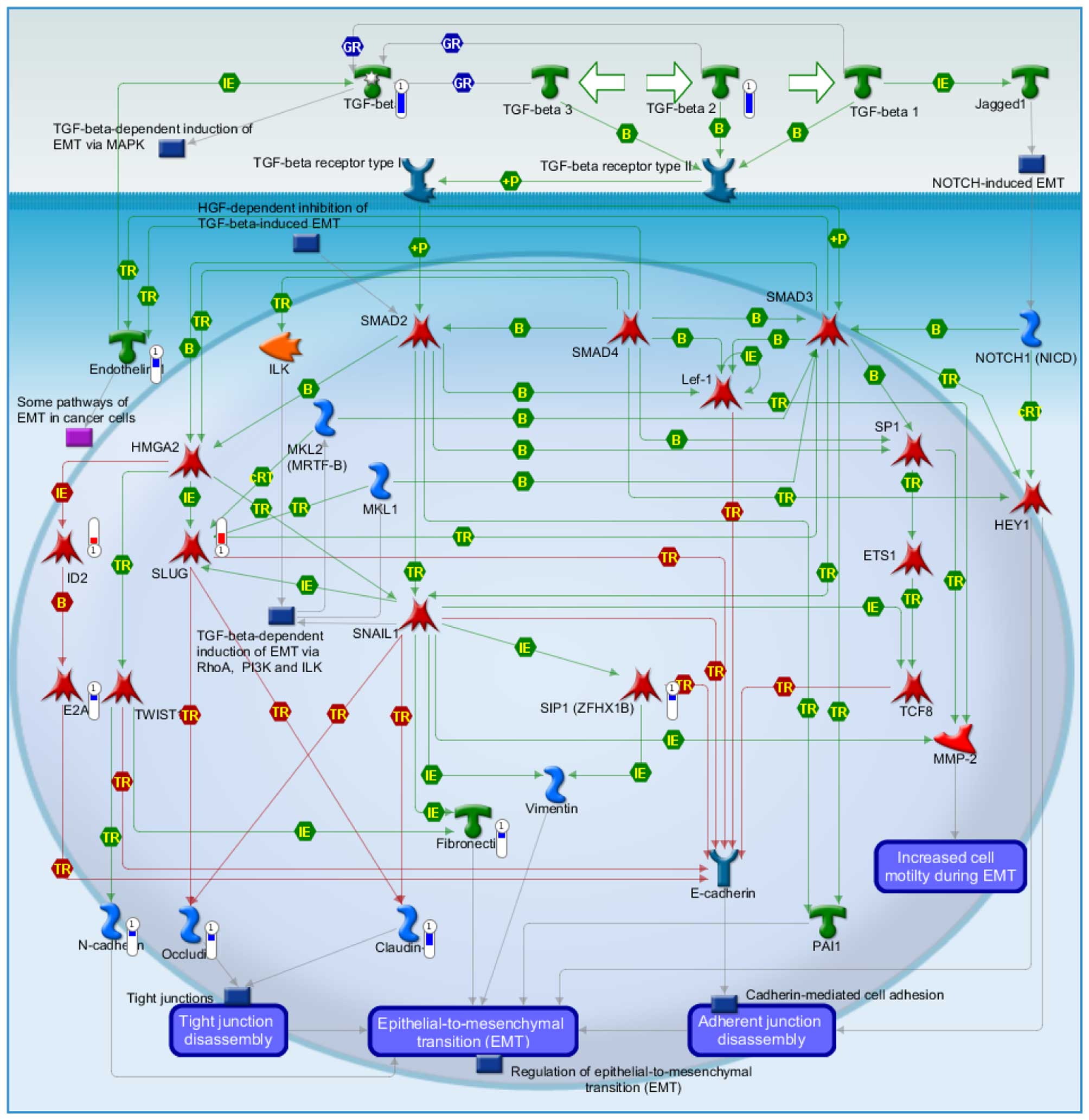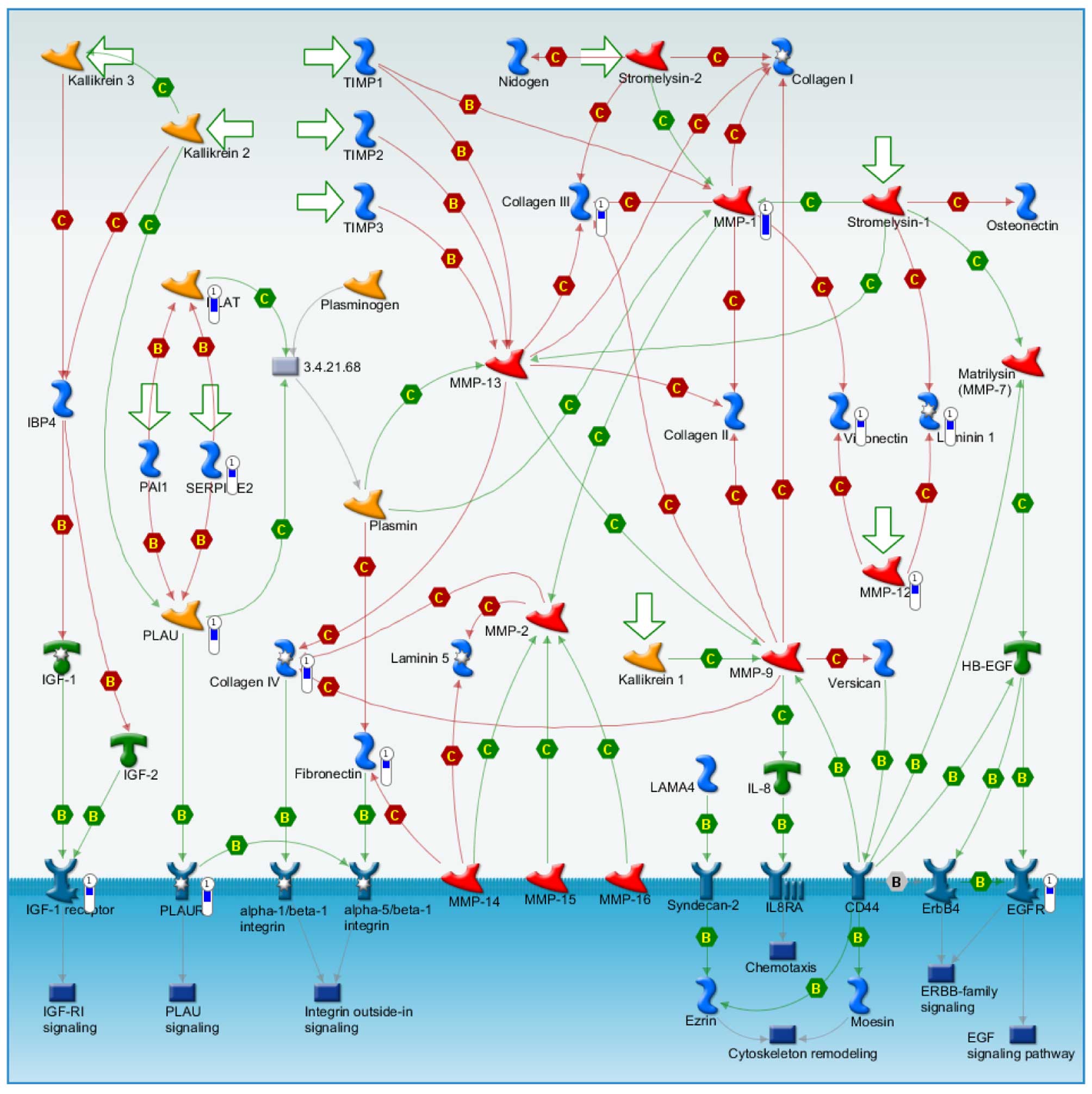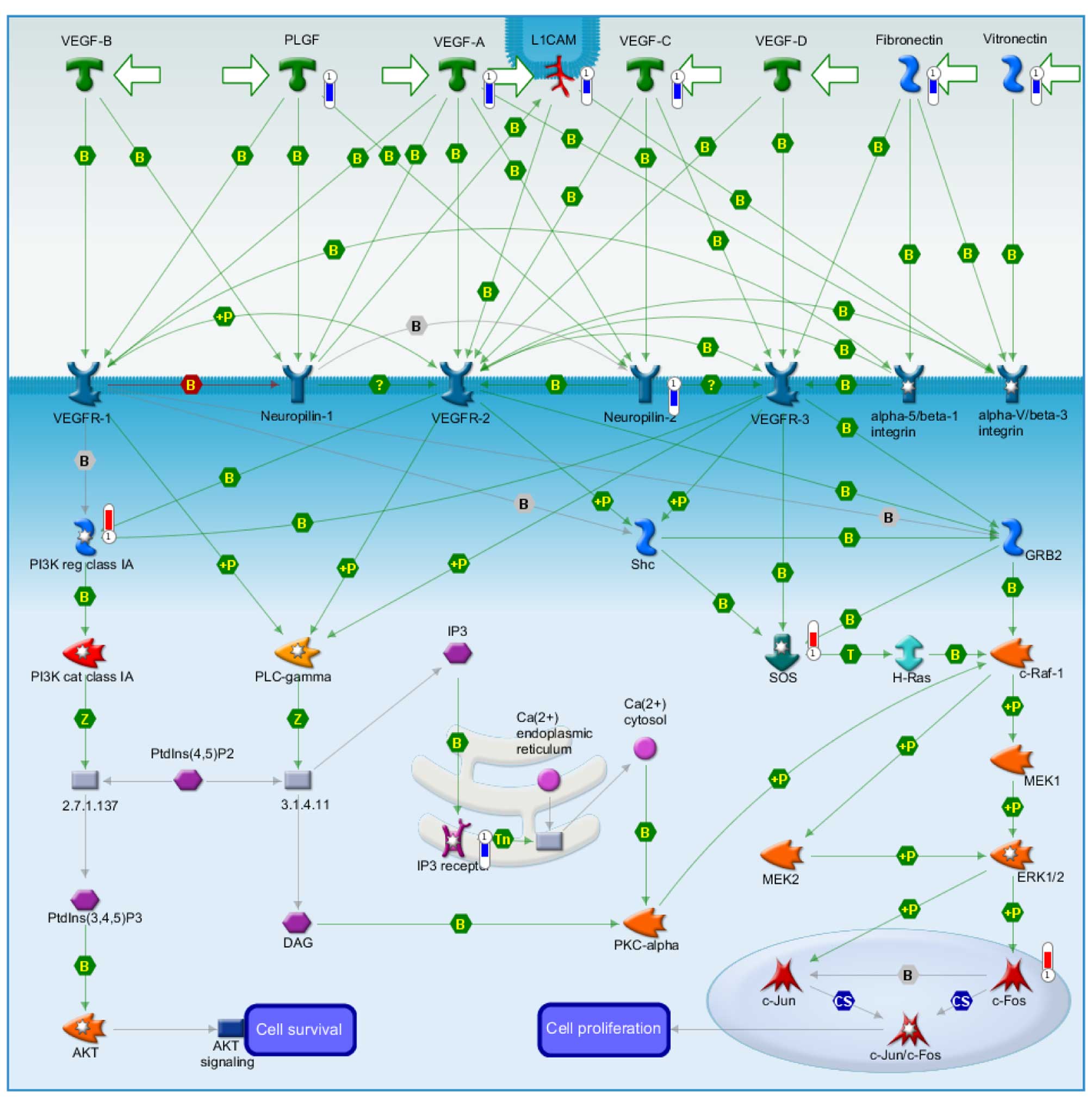|
1
|
Buyukcelik A, Yalcin B and Utkan G:
Multidisciplinary management of lung cancer. N Engl J Med.
350:2008–2010. 2004. View Article : Google Scholar : PubMed/NCBI
|
|
2
|
Jemal A, Bray F, Center MM, Ferlay J, Ward
E and Forman D: Global cancer statistics. CA Cancer J Clin.
61:69–90. 2011. View Article : Google Scholar : PubMed/NCBI
|
|
3
|
McCulloch M, See C, Shu XJ, Broffman M,
Kramer A, Fan WY, Gao J, Lieb W, Shieh K and Colford JM Jr:
Astragalus-based Chinese herbs and platinum-based chemotherapy for
advanced non-small-cell lung cancer: Meta-analysis of randomized
trials. J Clin Oncol. 24:419–430. 2006. View Article : Google Scholar : PubMed/NCBI
|
|
4
|
Tsai MF, Wang CC and Chen JJ: Tumour
suppressor HLJ1: A potential diagnostic, preventive and therapeutic
target in non-small cell lung cancer. World J Clin Oncol.
5:865–873. 2014. View Article : Google Scholar : PubMed/NCBI
|
|
5
|
Prasad S, Tyagi AK and Aggarwal BB: Recent
developments in delivery, bioavailability, absorption and
metabolism of curcumin: The golden pigment from golden spice.
Cancer Res Treat. 46:2–18. 2014. View Article : Google Scholar : PubMed/NCBI
|
|
6
|
Hasima N and Aggarwal BB: Cancer-linked
targets modulated by curcumin. Int J Biochem Mol Biol. 3:328–351.
2012.
|
|
7
|
Campbell FC and Collett GP:
Chemopreventive properties of curcumin. Future Oncol. 1:405–414.
2005. View Article : Google Scholar
|
|
8
|
Sarkar FH and Li Y: Cell signaling
pathways altered by natural chemopreventive agents. Mutat Res.
555:53–64. 2004. View Article : Google Scholar : PubMed/NCBI
|
|
9
|
Shishodia S, Sethi G and Aggarwal BB:
Curcumin: Getting back to the roots. Ann NY Acad Sci. 1056:206–217.
2005. View Article : Google Scholar
|
|
10
|
Zanotto-Filho A, Braganhol E, Edelweiss
MI, Behr GA, Zanin R, Schröder R, Simões-Pires A, Battastini AM and
Moreira JC: The curry spice curcumin selectively inhibits cancer
cells growth in vitro and in preclinical model of glioblastoma. J
Nutr Biochem. 23:591–601. 2012. View Article : Google Scholar
|
|
11
|
Xiao K, Jiang J, Guan C, Dong C, Wang G,
Bai L, Sun J, Hu C and Bai C: Curcumin induces autophagy via
activating the AMPK signaling pathway in lung adenocarcinoma cells.
J Pharmacol Sci. 123:102–109. 2013. View Article : Google Scholar : PubMed/NCBI
|
|
12
|
Chen QY, Zheng Y, Jiao DM, Chen FY, Hu HZ,
Wu YQ, Song J, Yan J, Wu LJ and Lv GY: Curcumin inhibits lung
cancer cell migration and invasion through Rac1-dependent signaling
pathway. J Nutr Biochem. 25:177–185. 2014. View Article : Google Scholar : PubMed/NCBI
|
|
13
|
Lev-Ari S, Starr A, Katzburg S, Berkovich
L, Rimmon A, Ben-Yosef R, Vexler A, Ron I and Earon G: Curcumin
induces apoptosis and inhibits growth of orthotopic human non-small
cell lung cancer xenografts. J Nutr Biochem. 25:843–850. 2014.
View Article : Google Scholar : PubMed/NCBI
|
|
14
|
Shen Y, Zhang S, Huang X, Chen K, Shen J
and Wang Z: Involvement of p53 mutation and mismatch repair
proteins dysregulation in NNK-induced malignant transformation of
human bronchial epithelial cells. Biomed Res Int. 2014:9202752014.
View Article : Google Scholar : PubMed/NCBI
|
|
15
|
Muller PA and Vousden KH: p53 mutations in
cancer. Nat Cell Biol. 15:2–8. 2013. View
Article : Google Scholar
|
|
16
|
Bunn PA Jr: Worldwide overview of the
current status of lung cancer diagnosis and treatment. Arch Pathol
Lab Med. 136:1478–1481. 2012. View Article : Google Scholar : PubMed/NCBI
|
|
17
|
Eberhard DA, Johnson BE, Amler LC, Goddard
AD, Heldens SL, Herbst RS, Ince WL, Jänne PA, Januario T, Johnson
DH, et al: Mutations in the epidermal growth factor receptor and in
KRAS are predictive and prognostic indicators in patients with non-
small-cell lung cancer treated with chemotherapy alone and in
combination with erlotinib. J Clin Oncol. 23:5900–5909. 2005.
View Article : Google Scholar : PubMed/NCBI
|
|
18
|
Kwak EL, Bang YJ, Camidge DR, Shaw AT,
Solomon B, Maki RG, Ou SH, Dezube BJ, Jänne PA, Costa DB, et al:
Anaplastic lymphoma kinase inhibition in non-small-cell lung
cancer. N Engl J Med. 363:1693–1703. 2010. View Article : Google Scholar : PubMed/NCBI
|
|
19
|
Wu SH, Hsiao YT, Chen JC, Lin JH, Hsu SC,
Hsia TC, Yang ST, Hsu WH and Chung JG: Bufalin alters gene
expressions associated DNA damage, cell cycle, and apoptosis in
human lung cancer NCI-H460 cells in vitro. Molecules. 19:6047–6057.
2014. View Article : Google Scholar : PubMed/NCBI
|
|
20
|
Gardina PJ, Clark TA, Shimada B, Staples
MK, Yang Q, Veitch J, Schweitzer A, Awad T, Sugnet C, Dee S, et al:
Alternative splicing and differential gene expression in colon
cancer detected by a whole genome exon array. BMC Genomics.
7:3252006. View Article : Google Scholar : PubMed/NCBI
|
|
21
|
Li Z, Meng Q, Yu Q, Zhou Z and Li L:
Evaluation of c-myc and CCNE2 amplification in breast cancer with
quantitative multigene fluorescence in-situ hybridization. Zhonghua
Bing Li Xue Za Zhi. 43:455–458. 2014.In Chinese. PubMed/NCBI
|
|
22
|
Kawase T, Ichikawa H, Ohta T, Nozaki N,
Tashiro F, Ohki R and Taya Y: p53 target gene AEN is a nuclear
exonuclease required for p53-dependent apoptosis. Oncogene.
27:3797–3810. 2008. View Article : Google Scholar : PubMed/NCBI
|
|
23
|
Shahbazi J, Lock R and Liu T: Tumor
protein 53-induced nuclear protein 1 enhances p53 function and
represses tumorigenesis. Front Genet. 4:802013. View Article : Google Scholar : PubMed/NCBI
|
|
24
|
Kim GS, Kang J, Bang SW and Hwang DS: Cdc6
localizes to S- and G2-phase centrosomes in a cell cycle-dependent
manner. Biochem Biophys Res Commun. 456:763–767. 2015. View Article : Google Scholar
|
|
25
|
Bidkhori G, Narimani Z, Hosseini Ashtiani
S, Moeini A, Nowzari-Dalini A and Masoudi-Nejad A: Reconstruction
of an integrated genome-scale co-expression network reveals key
modules involved in lung adenocarcinoma. PLoS One. 8:e675522013.
View Article : Google Scholar : PubMed/NCBI
|
|
26
|
Davidson G and Niehrs C: Emerging links
between CDK cell cycle regulators and Wnt signaling. Trends Cell
Biol. 20:453–460. 2010. View Article : Google Scholar : PubMed/NCBI
|
|
27
|
Ding Y, Zhu W, Sun R, Yuan G, Zhang D, Fan
Y and Sun J: Diphenylene iodonium interferes with cell cycle
progression and induces apoptosis by modulating NAD(P)H
oxidase/ROS/cell cycle regulatory pathways in Burkitt's lymphoma
cells. Oncol Rep. 33:1434–1442. 2015.PubMed/NCBI
|
|
28
|
Jiang DS, Wei X, Zhang XF, Liu Y, Zhang Y,
Chen K, Gao L, Zhou H, Zhu XH, Liu PP, et al: IRF8 suppresses
pathological cardiac remodelling by inhibiting calcineurin
signalling. Nat Commun. 5:33032014. View Article : Google Scholar : PubMed/NCBI
|
|
29
|
Li L, Chen W, Zhu Y, Wang X, Jiang DS,
Huang F, Wang L, Xiang F, Qin W, Wang Q, et al: Caspase recruitment
domain 6 protects against cardiac hypertrophy in response to
pressure overload. Hypertension. 64:94–102. 2014. View Article : Google Scholar : PubMed/NCBI
|
|
30
|
Norton JD: ID helix-loop-helix proteins in
cell growth, differentiation and tumorigenesis. J Cell Sci.
113:3897–3905. 2000.PubMed/NCBI
|
|
31
|
Lasorella A, Uo T and Iavarone A: Id
proteins at the cross-road of development and cancer. Oncogene.
20:8326–8333. 2001. View Article : Google Scholar
|
|
32
|
Sikder HA, Devlin MK, Dunlap S, Ryu B and
Alani RM: Id proteins in cell growth and tumorigenesis. Cancer
Cell. 3:525–530. 2003. View Article : Google Scholar : PubMed/NCBI
|
|
33
|
Sun LY, Bokov AF, Richardson A and Miller
RA: Hepatic response to oxidative injury in long-lived Ames dwarf
mice. FASEB J. 25:398–408. 2011. View Article : Google Scholar :
|
|
34
|
Martins C, Doran C, Silva IC, Miranda C,
Rueff J and Rodrigues AS: Myristicin from nutmeg induces apoptosis
via the mitochondrial pathway and down regulates genes of the DNA
damage response pathways in human leukaemia K562 cells. Chem Biol
Interact. 218:1–9. 2014. View Article : Google Scholar : PubMed/NCBI
|
|
35
|
Wang X, Liu Y, Shao D, Qian Z, Dong Z, Sun
Y, Xing X, Cheng X, Du H, Hu Y, et al: Recurrent amplification of
MYC and TNFRSF11B in 8q24 is associated with poor survival in
patients with gastric cancer. Gastric Cancer. Jan 25–2015, (Epub
ahead of print). http://dx.doi.org/10.1007/s10120-015-0467-2.
View Article : Google Scholar
|
|
36
|
Kino T, Hurt DE, Ichijo T, Nader N and
Chrousos GP: Noncoding RNA gas5 is a growth arrest- and
starvation-associated repressor of the glucocorticoid receptor. Sci
Signal. 3:ra82010. View Article : Google Scholar : PubMed/NCBI
|
|
37
|
Mourtada-Maarabouni M, Hasan AM, Farzaneh
F and Williams GT: Inhibition of human T-cell proliferation by
mammalian target of rapamycin (mTOR) antagonists requires noncoding
RNA growth-arrest-specific transcript s5 (GAS5). Mol Pharmacol.
78:19–28. 2010. View Article : Google Scholar : PubMed/NCBI
|

















